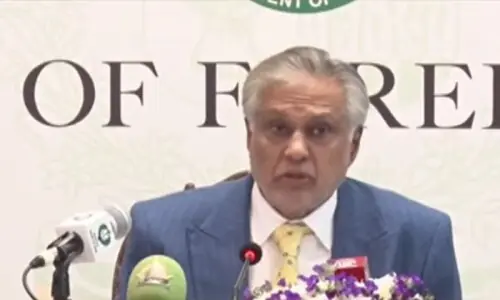On the weekend, one major English-language daily carried a front-page picture of the dead bodies, still on the noose, of two militants that were executed in Faisalabad on Friday evening.
Another English-language daily’s front-page photograph was of a ‘national solidarity’ rally held in Karachi on Friday, called by the MQM to condemn the events in Peshawar on Tuesday: the placard held by the young boys in the foreground reads “An eye for an eye; hang them all; hang them high”.
 |
| Supporters of Muttahida Quami Movement (MQM) hold signs to condemn the Taliban attack on the Army Public School in Peshawar, during national solidarity rally Karachi December 19, 2014. — Reuters |
Yet another picture, this time from the protests outside Lal Masjid in Islamabad, showed a citizen carrying a sign saying “Bhaag burqa bhaag”, a reference to the mosque’s cleric Abdul Aziz, who back in 2007 tried to escape a siege by disguising himself in women’s garb.
 |
| Activists of Civil Society hold a demonstration against the Peshawar incident outside Lal Masjid.— Online |
Our confused mindset portends further distress.
The horror that transpired in Peshawar’s Army Public School last week is too much to bear. Yet the confused and conflicted mindset of the citizenry, as reflected by the reactions to the Peshawar outrage, portends even more distress.
The Pakistani state and society have arrived at the current pass after a long journey that has been spent discussing the difference between ‘good and bad’ Taliban, whether the perpetrators of violence are hardened terrorists or discontented brothers, and whether the correct course of action lies in dialogue and ‘peace talks’ or the waging of a military offensive.
Read: Militant siege of Peshawar school ends, 141 killed
The state itself has played both sides: consider, after all, that not too long before the Operation Zarb-i-Azb was launched in the region where the militants have created their sanctuaries, Prime Minister Nawaz Sharif led the call for a multi-party conference to come up with strategies to somehow cut a deal with the banned TTP.
All this back and forth has left citizens unable to make very basic distinctions that, if there was understanding and consensus, could create the much-needed societal push against violent extremism that this polity so desperately needs.
Also read | No distinction now between good and bad Taliban: Nawaz
The operation in the northwest has been opposed by a lot of people on several grounds, some valid and others not. The one I wish to highlight is that going after militants with force, with bombs and drones, would lay the ground open for a severe retaliation.
Some of these voices have become louder following last week’s events; the argument seems to be that in a way, the state and the military invited the murder, because that’s what they are guilty of doing in the northwest of the country against suspected militants and civilians caught in the crossfire.
Indeed, laying claim to the assault, the TTP did say last week that it was in revenge for the killings of “our women and children” by Pakistan Army hardware in the mountains bordering Afghanistan.
But this argument is unsound because of one very basic reason: that it was the TTP, and other assorted violent militant groups, that committed the primary and illegal transgression of taking up arms against the state, its apparatus, and its populace, civilian and military.
One can concede that a great many number of socio-economic, political and other factors led to these groups taking this course of action, not the least of them being that elements within the state sponsored them at least initially for perceived geo-strategic interests.
Yet, a state is duty-bound to bring to an end a violent revolt in which civilians are being targeted. It cannot afford to be squeamish in a theatre of war, which is what parts of the tribal areas effectively are. The security establishment doesn’t want to publicise it as such, because then the rules of war would apply, such as the protection of prisoners, but it should.
Then, there are voices — many of them from people who view themselves as liberal — of public executions and the killing of people found to have been involved in terrorism. Doesn’t such bloodthirstiness, though, bring such people down to the same level as those whom they oppose, ie trying to curb violence through further violence?
Also read: Nawaz removes moratorium on death penalty
No doubt it would be cathartic to see the perpetrators of the Peshawar attacks (had they been taken alive), or Mumtaz Qadri, the convicted killer of Salmaan Taseer, or the many others who have without flinching unleashed horror upon horror on Pakistanis, strung up; sure, it is tempting to wish upon them what they did to us; but the moral high ground lies in calling for them to face due process of law (the latter needs to be hugely strengthened and made much more efficient) and, crucially, the protection of the law.
In response to resistance from several quarters against the lifting of the moratorium on the death penalty, many ask why executions should not take place given the barbarity of the crimes committed. There’s a simple answer: because even one miscarriage of justice would undermine Pakistan’s position, which must always be one of impeccable ethics if it is to be different from its enemy.
The writer is a member of staff.
Published in Dawn, December 22th, 2014






























